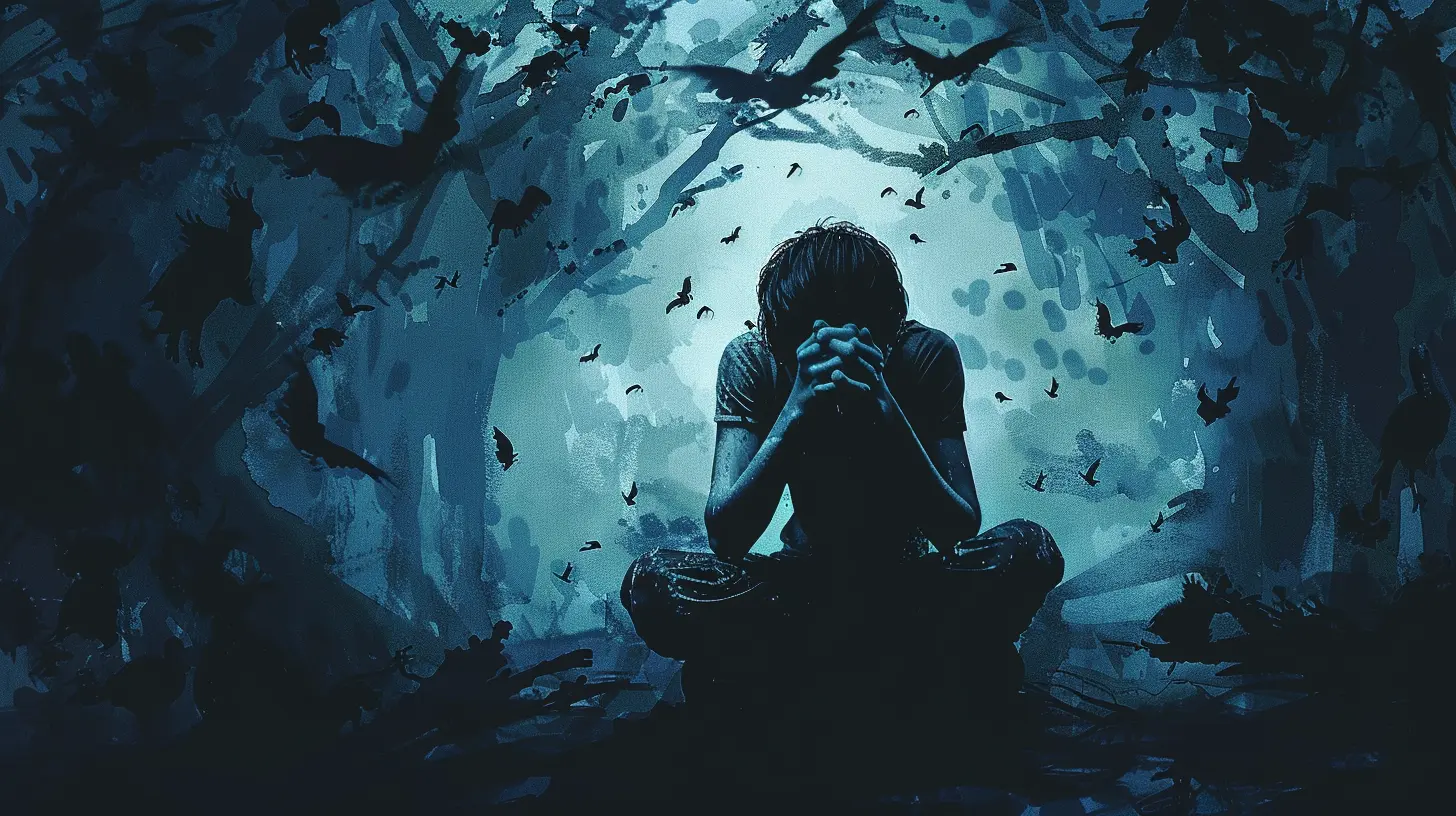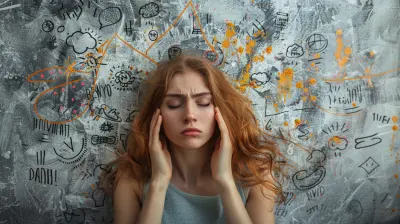How Phobias Can Lead to Other Mental Health Issues
26 February 2025
Imagine you're standing at the edge of a cliff, and a sudden wave of panic washes over you. Your heart races, your palms sweat, and you're almost paralyzed by fear. For some, this is just a fleeting moment. But for others, these types of intense fears—known as phobias—can take hold of their lives and lead to a cascade of other mental health issues.
Phobias are more than just being "scared" of something; they're deep-rooted fears that can cause significant distress. And when left unchecked, these fears can snowball into more severe mental health problems. In this article, we dive into how phobias can lead to other mental health issues, unraveling the interconnected web of fear and its consequences.

What Exactly Is a Phobia?
Before we delve into the effects, let's get clear on what a phobia really is. A phobia is an intense, irrational fear of a specific object, situation, or activity. While everyone experiences fear at some point, phobias are different. They can cause overwhelming anxiety and avoidance behaviors that interfere with daily life.There are different types of phobias, but the most common fall into three categories:
- Specific Phobias: These include fears of objects or situations (like spiders, heights, or flying).
- Social Phobia (Social Anxiety Disorder): Fear of social situations where one might be judged or embarrassed.
- Agoraphobia: Fear of being in places where escape might be hard, often leading to avoidance of public spaces.
But here's the thing—having a phobia doesn’t just mean you're afraid of something specific. When that fear becomes pervasive, it can lead to a domino effect of mental health challenges.

The Connection Between Phobias and Mental Health Issues
Anxiety Disorders
It's no surprise that phobias are closely related to anxiety disorders. In fact, phobias themselves are considered a type of anxiety disorder. However, when left unaddressed, the constant state of fear and avoidance can worsen general anxiety levels.Think of it like this: Imagine you're walking around with a heavy backpack filled with bricks. One brick represents your fear (say, a fear of flying). Over time, more bricks (like the fear of enclosed spaces or heights) are added. Before you know it, you're carrying a backpack so heavy that it weighs down every step you take. This is how phobias can exacerbate generalized anxiety disorders.
When someone has a phobia, they’re in a heightened state of alertness whenever they encounter (or even think about) their fear. This constant tension can leak into other areas of life, making them anxious even in situations unrelated to their phobia. If not treated, this can spiral into generalized anxiety disorder, where the person feels anxious almost all the time.
Depression
Phobias don’t just stir up anxiety—they can also lead to depression. Here's why: When a phobia starts to interfere with your daily life, it can limit your activities, social interactions, and even your sense of independence. Over time, this can make you feel isolated and helpless, which are major risk factors for depression.For example, someone with agoraphobia might avoid leaving their home altogether, cutting themselves off from friends, family, and opportunities for enjoyment. The isolation and frustration that come from avoiding situations due to fear can create a vicious cycle of sadness and hopelessness, leading to depression.
Moreover, the constant mental strain of battling a phobia can wear someone down emotionally. The energy it takes to avoid triggers, coupled with the emotional toll of managing fear, can contribute to feelings of exhaustion, irritability, and depression.
Panic Disorder
Have you ever felt so scared that it felt like the world was closing in on you? Panic attacks, which are sudden and intense bouts of fear, can often accompany phobias. And when someone has recurrent panic attacks, they might develop what's known as panic disorder.Phobias can trigger panic attacks because the body's fight-or-flight response kicks in full gear when exposed to the feared object or situation. Over time, the fear of having another panic attack can become just as debilitating as the phobia itself. This creates a snowball effect, where the person becomes anxious about the possibility of experiencing anxiety, leading to more frequent panic attacks.
For instance, someone with a fear of flying might experience a panic attack just thinking about boarding a plane. The fear becomes so overwhelming that it can lead to a full-blown panic disorder, where the individual lives in constant fear of panic attacks, even in unrelated situations.
Obsessive-Compulsive Disorder (OCD)
It might seem like a stretch, but phobias can also be connected to obsessive-compulsive disorder (OCD). How? Well, people with phobias often develop rigid avoidance behaviors or rituals to prevent encountering their fear. For example, someone with a fear of germs (mysophobia) might obsessively wash their hands or clean surfaces to avoid contamination.These repetitive behaviors can closely resemble OCD tendencies. In severe cases, the line between a phobia and OCD can blur, and the person becomes trapped in a cycle of obsessive thoughts and compulsive actions to stave off their fear.
Substance Abuse
When people feel overwhelmed by their phobias and the accompanying anxiety or depression, they might turn to substances like alcohol or drugs as a form of self-medication. While this might offer short-term relief, in the long run, it only exacerbates the problem.Substance abuse can lead to dependence, and over time, it can worsen mental health issues. Alcohol, for instance, can increase feelings of depression and anxiety, while drugs can impair judgment and increase risky behaviors. This creates a toxic cycle where the person uses substances to escape their phobia but ends up deepening their mental health struggles.

Why Phobias Often Go Untreated
You might be wondering, "If phobias can cause so much harm, why don’t more people seek help?" Well, part of the problem is that phobias are often minimized or misunderstood. It’s common for people to dismiss their fears as "just a quirk" or something they can live with. But the truth is, phobias are legitimate mental health concerns that deserve attention.Another barrier is the stigma surrounding mental health. Many people feel embarrassed or ashamed to admit they have a phobia, especially if it seems irrational to others. This can prevent them from seeking the help they need, leaving their fear to fester and potentially spiral into more severe mental health issues.

Breaking the Cycle: Treatment for Phobias and Related Issues
The good news is that phobias, along with the mental health issues they can lead to, are treatable. Here are some of the most effective treatment options:Cognitive-Behavioral Therapy (CBT)
CBT is one of the most widely used therapies for treating phobias. It helps individuals confront their fears in a safe and controlled environment while changing the negative thought patterns that fuel their anxiety. Through gradual exposure to the feared object or situation, CBT can help desensitize individuals to their triggers, reducing their anxiety over time.Exposure Therapy
Exposure therapy, a subset of CBT, is particularly effective for phobias. It involves gradually exposing the person to the source of their fear in a controlled way. This helps them realize that their feared outcome is unlikely or manageable. Over time, the fear response diminishes, and the person can function more freely.Medication
In some cases, medication may be prescribed to help manage the symptoms of anxiety, depression, or panic disorder that stem from a phobia. Antidepressants or anti-anxiety medications can offer relief while the person works on addressing the root cause of their fear through therapy.Mindfulness and Relaxation Techniques
Mindfulness, meditation, and relaxation techniques can also be helpful in managing the anxiety associated with phobias. These practices help individuals stay grounded and calm, even when faced with their fears. Over time, they can reduce the intensity of the fear response.Seeking Support
Talking to friends, family, or a support group can be incredibly beneficial when dealing with a phobia. Sharing your experiences with others who understand can reduce feelings of isolation and provide encouragement to seek professional help.Conclusion
Phobias may start as an intense fear of a specific object or situation, but they can have far-reaching effects on mental health. From anxiety and depression to panic disorders and substance abuse, the ripple effects of untreated phobias are significant. The key to breaking the cycle is acknowledging the problem and seeking help. With the right treatment and support, it's possible to overcome phobias and prevent them from leading to more severe mental health issues.If you or someone you know is struggling with a phobia, remember that help is available. Don't let fear control your life—take the first step toward healing.
all images in this post were generated using AI tools
Category:
PhobiasAuthor:

Matilda Whitley
Discussion
rate this article
11 comments
Lydia McHugh
Insightful article! Phobias greatly impact overall mental health.
April 5, 2025 at 4:07 AM

Matilda Whitley
Thank you! I'm glad you found it insightful. Phobias can indeed have a significant ripple effect on mental health.
Zoey Beck
Phobias can create a cycle of fear and avoidance, potentially leading to anxiety disorders or depression. Understanding this connection is crucial for effective treatment and support.
March 31, 2025 at 3:51 AM

Matilda Whitley
Thank you for highlighting this important connection! Understanding how phobias can lead to anxiety and depression is key to effective treatment and support.
Rivenheart Stevens
Phobias' impact on mental health underscores the need for comprehensive treatment.
March 22, 2025 at 4:07 AM

Matilda Whitley
Thank you for your insightful comment! Indeed, addressing phobias is crucial for preventing further mental health complications. Comprehensive treatment can make a significant difference.
Zachary Bellamy
Phobias can significantly impact an individual's mental health, often leading to increased anxiety, depression, and avoidance behaviors. Understanding the connection between phobias and subsequent mental health issues is crucial for effective treatment. Early intervention and tailored therapeutic approaches can help mitigate these effects and improve overall well-being.
March 19, 2025 at 4:22 AM

Matilda Whitley
Thank you for your insightful comment! I completely agree that understanding the link between phobias and mental health is vital for effective treatment and improving well-being. Early intervention truly makes a difference.
Katalina Maddox
This article insightfully highlights the intricate link between phobias and broader mental health challenges. By understanding how phobias can contribute to conditions like anxiety and depression, we can better address these issues holistically, fostering more effective treatment strategies for those affected. Great read!
March 14, 2025 at 4:26 AM

Matilda Whitley
Thank you for your thoughtful comment! I'm glad you found the article insightful and valuable for understanding the interconnectedness of phobias and mental health.
Rosalie McGinnis
This article insightfully explores the cascade effect of phobias on mental health, highlighting their role in triggering anxiety disorders, depression, and avoidance behaviors. Understanding this relationship is crucial for developing effective treatment strategies, as addressing phobias can lead to improved overall mental well-being and functioning.
March 9, 2025 at 6:00 PM

Matilda Whitley
Thank you for your insightful comment! I'm glad you found the connection between phobias and mental health issues important. Understanding this relationship is indeed key to effective treatment.
Silas McDowney
This article highlights the complex relationship between phobias and mental health, emphasizing the importance of addressing both for effective treatment.
March 8, 2025 at 4:55 AM

Matilda Whitley
Thank you for your insightful comment! Addressing both phobias and mental health is indeed crucial for comprehensive treatment and better outcomes.
Zelda Wagner
Thank you for shedding light on this important connection; understanding phobias is truly vital.
March 6, 2025 at 4:30 AM

Matilda Whitley
You're welcome! I'm glad you found it valuable. Understanding phobias is indeed crucial for overall mental health.
Cora Snow
Great article! It’s so important to understand how phobias can impact overall mental well-being. Awareness and support are key in addressing these issues. Thank you for shedding light on this crucial topic—let's keep the conversation going!
March 2, 2025 at 5:41 PM

Matilda Whitley
Thank you for your thoughtful comment! I completely agree—awareness and support are essential in addressing phobias and their broader impact on mental health. Let's continue the conversation!
Priscilla Coleman
Phobias: the ultimate party crashers of mental health—showing up uninvited and chaotic!
March 1, 2025 at 3:43 AM

Matilda Whitley
Absolutely! Phobias can disrupt not only our daily lives but also pave the way for more serious mental health challenges, making it essential to address them proactively.
Blade McDougal
Phobias aren’t just pesky fears; they're like that uninvited guest at a party, causing mental chaos. Ignore them, and you might just find anxiety, depression, or even PTSD crashing the festivities. Time to kick those phobias to the curb!
February 28, 2025 at 4:45 AM

Matilda Whitley
Absolutely! Phobias can indeed escalate and contribute to more serious mental health issues if left unaddressed. Tackling them early is crucial for overall well-being.
MORE POSTS

How to Address Burnout with the Help of a Counselor

Cognitive Behavioral Therapy for Social Anxiety: A Path to Confidence

How to Manage Stress in a Healthy Way with the Help of a Therapist

How Cognitive Behavioral Therapy Can Help You Overcome Shame

How to Use Emotional Intelligence to Set Healthy Boundaries

Why Failure is an Opportunity to Grow Your Emotional Resilience

How to Create a Personalized Anxiety Management Plan

Understanding the Power of Influence in Leadership